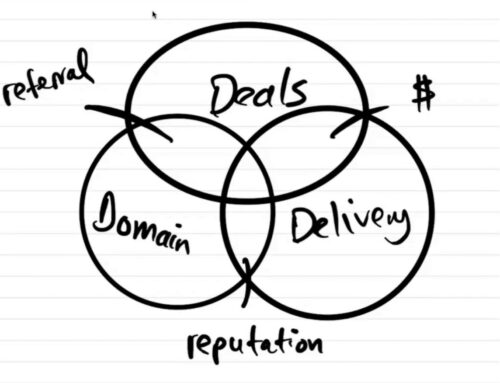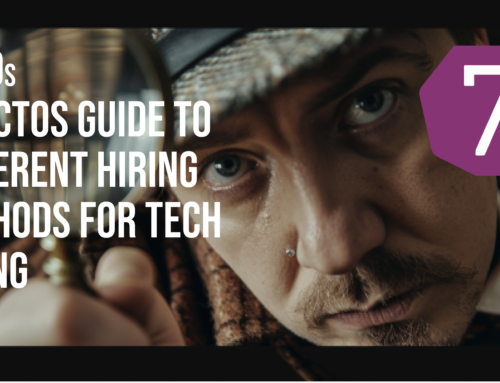Technology and The Ethics of Data Collection , with Fabrice Gould
With Europe’s GDPR and Facebook and Cambridge Analytica in the news of late, technology’s role in data collection and the ethics of it is a hot topic. Joining us to share his considerable expertise is Fabrice Gould of Diggen.
Fabrice has long had a love of data integration, and all of his startups are steeped in that passion. You’ll get a taste of that passion today; you’ll hear him explain what a data service provider actually is, how his company helps other companies stay compliant in their data collection and much more. Tune in for this insightful episode of CTO Studio.
In this episode, you’ll hear:
- What’s the probability of selling to your existing customers?
- Why software engineering and data services are two separate entities.
- Where did his latest company’s name come from?
- What is PII and why are so many businesses running from it?
- Is block chain a potential solution to the consumer data issue?
- And so much more!
Fabrice Gould grew up in Manhattan before attending the University of Maryland where he studied computer science and mechanical engineering. He loved building stuff and hated business, sales, advertising and marketing!
After graduation he went to work for GE for almost a decade, at the time it was the world’s largest company. He lead the largest efforts at GE’s information services for salesforce automation (in the pre-web and pre-cloud era), along with their first ecommerce and first ERPs and ERM.
It was a fascinating experience he says, but because he hated all the front office aspects like marketing, sales and advertising he had no idea how they were making money. That changed when the e-commerce group he was leading, they taught him about entrepreneurship and start ups. Eventually he quit GE and moved to California on a whim.
Originally he had planned to go to LA or San Francisco but he jokingly says he got stuck at the beach in San Diego! At the time there wasn’t a start-up community in town. This move led to what he calls his second chapter: he got out of the tech side, learned about business, went to work at the world’s smallest company, and got his MBA and started a doctorate at the world’s smallest school! He then taught at that school, and the ran the entrepreneurship program for 3 years. Now he loves all things business.
But fast forward to today and he’s built 3 startups, and is working on his fourth now. For him it’s always been about data and technology with the intention to help sales and marketing efforts of the business. He loves focusing on B2B and helping other companies grow and become successful.
Those three startup companies he built were in local search (always in data and business). They were focused on collecting companies’ data and providing that data to the public so when someone was searching for a company’s address they could find it online. It’s something available to us all now but it wasn’t back then.
Fabrice’s company went from being a start up to being the #1 data provider for search engines. The information we find now when we Google a brick and mortar company’s location is all from data they provided.
Another start up of his was 1800 San Diego, the first business he created when he came to San Diego. Even though he hated advertising and marketing at the time he changed his tune when he could see the value and relevancy of creating data for the consumer who was calling in. They played a quick ad related to the company they were calling about and then in turn his company gathered data about the consumers. That experience really showed him how valuable data can be to businesses’ sales and marketing efforts.
Next I asked him about the type of data they collect: is it personal? He says it is the type of data you see in the news today. In fact, he thought this (the stories about Facebook and Cambridge Analytica, the GDPR in Europe, etc.) wasn’t going to happen for another 5-10 years.
This data is about PII – personal identifiable information. Most companies are running away from PII because it scares them. How do you keep the PII data secure? How do you ensure you are following regulations? But his company, Diggen, helps businesses answer those questions and not run away from them.
They work to find ways to make their clients’ customers happy and use the data correctly, and have control. They make sure companies aren’t taking advantage of the data, but are benefitting from using it. They are in the middle of the transition within the industry, and it’s been great timing for them. But there is the challenge of doing it right by following the regulations but still giving the industry what it wants.
Because he emphasizes using data for marketing and sales purposes, I asked if that is when a company would hire Diggen – when they wanted data to support their marketing and sales?
Yes, that’s exactly when people hire Diggen, according to Fabrice. He says it is funny how the word data is used today because it covers so much! It’s important to be very specific about what type of data you are referring to, for them it is data about an individual business. So if you are in B2B it is about the decision-maker at a particular business you are pursuing or trying to do business with. On the B2C side it is more about the individual, and they focus on this side more than the other.
To explain this better he gives a simple use case: Demographics is the basic information. So imagine having 100,000 subscribers on your newsletter list or in your customer base. Instead of sending them one email, wouldn’t it be helpful to know their gender so you could create a separate email with different graphics and messaging more relevant to each gender? It would help with your conversions, and shows why being data-driven is so helpful.
As you add more attributes you further segment your audience. Your ultimate goal is to get to personalization and one on one conversations so your customers feel like they have a relationship with you and you truly know them. And of course your company benefits from that kind of connection. From there we go into greater detail on what Diggen does and doesn’t do, and why it’s so important for consumers’ to have their voices heard about how their data is used.
Fabrice also tells us about his exploration of data on the dark web and what is the one thing you don’t want to do to preserve your data. We get into those topics plus his observations about CTOs in the tech community today on this episode of CTO Studio with Fabrice Gould.
Share This Story, Choose Your Platform!
Related Podcasts




